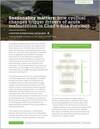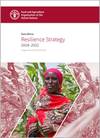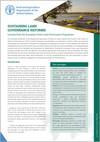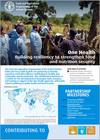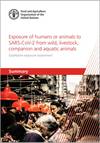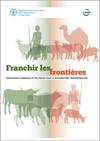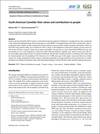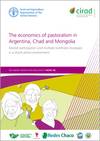This brief summarizes the seasonal patterns of acute malnutrition and its key drivers in the Goz Beida Region of Chad. It reveals a nuanced and complex seasonal pattern of wasting characterized by two different sized peaks with likely different drivers; a primary and larger peak at the start of the rains and a secondary smaller peak prior to the harvest. As well as exploring the basic, immediate, and underlying drivers of acute malnutrition, this briefing paper offers recommendations for programming and evaluation that are grounded in a seasonal perspective.
Year of publication: 2020Organization: , Auteurs individuels
Topic: Sécurité alimentaire
Language: English
Type of document: Technique
Geographical coverage: Afrique centrale
The FAO Programme of Work 2020–2021 is the second module of the Eastern Africa Resilience Strategy 2018–2022, and the two should therefore be read in conjunction. The main features of the new Programme of Work were presented and discussed with resource partners in Nairobi in December 2019. While the strategic objective, outcomes and outputs remain unchanged, the new Programme of Work’s activities reflect global evolutions in the humanitarian-development ecosystem, recent and emerging regional threats and risks, particularly Desert Locust and COVID-19, and lessons learned during the past two years.
Year of publication: 2020Organization: Organisation des Nations Unies pour l'alimentation et l'agriculture (FAO)
Topic: Sécurité alimentaire, Résilience
Language: English
Type of document: Technique
Geographical coverage: Afrique orientale
By means of a Transversal Project, co-funded by the EU and the Swiss Agency for Development and Cooperation (SDC), the Food and Agriculture Organization of the United Nations (FAO) coordinates, supports and consolidates the implementation of the EU Land Governance Programme. The European Union Land Governance Programme funds 18 individual country-level projects in Africa, Asia and Latin America, all of which address tenure issues, and are implemented alongside various partners, among which are government agencies, civil society organizations, bilateral and multilateral organizations and private contractors. All project activities are carried out within the framework of the VGGT and, in the African context, the African Union Declaration on Land Issues and Challenges in Africa (AU Declaration) and its Framework and Guidelines on Land Policy in Africa (F&G).
Year of publication: 2020Organization: Organisation des Nations Unies pour l'alimentation et l'agriculture (FAO)
Topic: Régime foncier
Language: English
Type of document: Technique
Geographical coverage: Asie du Sud
FAO and Texas A&M AgriLife are partnering to develop capacities and build resilience contributing to healthy and sustainable animal production. This collaboration functions as a vehicle for the development of innovative tools, resources, and training in support of the One Health approach, which links animal wellbeing to public health and food security.
Year of publication: 2020Organization: Organisation des Nations Unies pour l'alimentation et l'agriculture (FAO), Auteurs individuels
Topic: Sécurité alimentaire, Services sociaux
Language: English
Type of document: Technique
Geographical coverage: Afrique occidentale, Afrique centrale, Afrique orientale
SARS-CoV-2 is an emerging virus currently causing a large epidemic of COVID-19. Countries have asked FAO to provide guidance on how to investigate the potential animal sources(s) of the virus. This summary provides a shorter version of the original paper on rapid qualitative risk assessment for SARS-CoV-2 spillover at animal-human interface, and highlights the key knowledge gaps and recommendations.
Year of publication: 2020Organization: Organisation des Nations Unies pour l'alimentation et l'agriculture (FAO)
Topic: Services environnementaux, Services sociaux
Language: English
Type of document: Politiques et législation
Geographical coverage: Global
Dans de nombreux pays, le pastoralisme a toujours été pratiqué dans des zones qui sont aujourd’hui cloisonnées par des frontières internationales. Cela est un obstacle majeur à la gestion durable des ressources et au développement pastoral. Cependant, il existe des exemples dans le monde entier d'efforts visant à faciliter les mouvements transfrontaliers et la gestion des écosystèmes transfrontaliers par les pasteurs. Ce rapport examine comment la mobilité pastorale a été affectée par la création de frontières artificielles au sein des terres des pasteurs et comment les sociétés font face à ces contraintes par des arrangements légaux ou informels.
Year of publication: 2020Organization: Organisation des Nations Unies pour l'alimentation et l'agriculture (FAO), Union internationale pour la conservation de la nature (IUCN)
Topic: Conflit, Régime foncier, Résilience
Language: Français
Type of document: Technique
Geographical coverage: Global
South American Camelids (SACs) make several material and non-material contributions to people and are a key component of the Andean biocultural heritage. In this paper, we present three case studies (chakus for vicuña management, llama caravans, and llama nanobodies) to bring attention to the essential role of vicuñas and llamas for Andean communities today, their intercultural linkages with the Western world, and telecoupling interactions.
Year of publication: 2020Organization: Auteurs individuels
Topic: Services environnementaux, Participation
Language: English
Type of document: Scientifique
Geographical coverage: Amérique Latine
Accurate and reliable knowledge about the economics of pastoralism is yet to be understood and absorbed at the local, regional and national levels, based on reliable data. With Argentina, Chad and Mongolia as pilot cases, this study by CIRAD, commissioned by FAO, funded by IFAD and facilitated by pastoralist associations (Fundación Gran Chaco, Réseau Billital Maroobé, and the National Federation of Pasture User Groups), aimed to fulfil this knowledge gap through a multifunctional assessment of pastoral production systems and their economic contribution. Importantly, incorporating self-consumption of pastoralist households’ productions themselves as an key component of gross revenue shows a significant increase in their contribution to national GDPs. The diversified sources of revenue and the importance of self-consumption also indicate that pastoral systems fulfil a range of functions (income, food security, flexible labor, etc.).
Year of publication: 2020Organization: Organisation des Nations Unies pour l'alimentation et l'agriculture (FAO), Centre de coopération internationale en recherche agronomique pour le développement (CIRAD)
Topic: Économie
Language: English
Type of document: Technique
Geographical coverage: Amérique Latine, Afrique occidentale, Asie centrale


